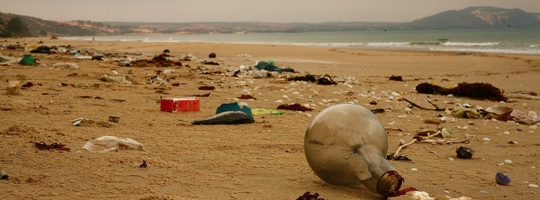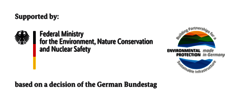Conference Marine Litter
3. International RETech-Conference „Circular Economy against Marine Litter“
21st and 22nd of November 2019 in Berlin with around 150 speakers and participants
The conference was organised jointly by the German RETech Partnership and the Federal Environment Ministry under the patronage of Federal Environment Minister Svenja Schulze. It brought together politicians, administrators, industry and representatives of affected countries. Speakers from eight countries presented their experiences during the conference, especially of countries with the largest amaounts of plastic loads in the rivers, seas and oceans. They reported about local projects and initiatives in which various measures are being taken to establish a conscious approach to waste. The conference strengthened the international exchange of experience and provided impetus for new projects. In addition, it brought together the current state of knowledge in the development of environmentally sound disposal and recycling structures.
At the conference, the Federal Environment Ministry also presented its commitment to the "Marine Debris Framework - Regional hubs around the globe" (Marine:DeFRAG) and announced the launch of a new funding programme to develop waste management and recycling structures in Asia and Africa. It focuses on countries and river regions from which the largest quantities of waste are discharged into the oceans. These are located in Asia and Africa. In addition, projects are to be carried out in coastal regions and island states where the main input of waste takes place directly from land.
Background
According to estimates by the German Federal Environment Agency, around 100 to 142 million tons of waste currently pollute the world's waters, most of it plastic. WWF estimates that of the approximately 300 million tonnes of new plastics produced each year, between 4.8 and 12.7 million tonnes of plastic waste are added to the global total each year and end up in the environment in an unorganised manner. Other environmental organizations, indeed, report yearly input quantities of 25 million tons. At the same time, the final degradation of plastics in seawater takes up to 450 years.
Considering all bulk plastics ever produced, taking into account production, use and end-of-life management, the total production volume so far is 8,300 million tons of virgin plastics. Of this, approximately 6,300 million tons of plastic waste were produced by 2015, of which approximately 9% was recycled, 12% incinerated, and 79% collected or deposited in landfills or in nature.
The main input of plastic waste into the oceans is via river systems. Not all rivers worldwide are equally polluted. Researchers have calculated that the ten river systems with the highest plastic loads (eight of them in Asia, two in Africa) - some of which are home to hundreds of millions of people - are responsible for around 90 percent of the global plastic discharge into the sea. Thus, a large proportion of marine litter enters the sea in developing and newly industrializing countries, especially China, India, and from other areas of Southeast Asia. But increasing marine litter is also a problem to be solved in the Mediterranean region and on the North and Baltic Seas. Added to this is cargo lost at sea, as well as fishing nets and microplastics from cosmetics, textiles and other products contained in wastewater. Thus, in addition to plastic from shipping or fishing, it is mainly plastic from land that enters the oceans via rivers. This happens especially in countries where the collection, treatment and landfilling of waste does not function properly.
In expansion, plastics consumption is increasing rapidly worldwide. This is due to economic growth, urbanization and changing production and consumption habits. Around half of the plastic produced each year is used for short-lived applications such as packaging and disposable articles. Improperly disposed of plastic waste poses a major challenge to ecosystems and human health, but also to economic sectors such as fisheries and tourism, which are of great economic importance in many countries, often developing and newly industrializing countries, due to their employment intensity.
In addition to efforts to reduce plastic consumption, the establishment of a functioning waste management system on land is a mandatory prerequisite for avoiding the annually growing plastic input into water systems. This includes systems for the collection of (plastic) waste, its transport, the establishment of appropriate treatment facilities, recycling structures and orderly disposal routes, if material or thermal recycling is not possible.
Furthermore to capacity building and the creation of the technical prerequisites, the main prerequisites here are the establishment of legally binding framework conditions and the securing of financing for both the development and the sustainable operation of appropriate waste management systems. This poses a particular challenge in the countries bordering the 10 rivers with the largest plastic loads. In this context, the establishment of extended producer responsibility (EPR) systems is also of particular importance.
Sources:
- https://www.umweltbundesamt.de/themen/wasser/gewaesser/meere/nutzung-belastungen/muell-im-meer
- www.wwf.de/themen-projekte/meere-kuesten/plastik/unsere-ozeane-versinken-im-plastikmuell/
- https://www.regenwald.org/petitionen/1124/hilfe-wir-ersticken-im-plastik-die-eu-muss-handeln
- https://www.bundestag.de/resource/blob/191538/4c909e54e967ca14db8cf287c08c0db3/plastikmuell-data.pdf
- https://www.bundestag.de/resource/blob/577836/01be079687d07bbb3a51edd15116df49/WD-8-089-18-pdf-data.pdf
- http://umwelt.scienceticker.info/2017/10/17/plastikmuell-kommt-ueber-fluesse-ins-meer/
- https://www.zeit.de/wissen/umwelt/2009-12/erde-sd-kunststoffmuell
Objectives
- Exchange of experience and transfer of knowledge on promising approaches to reducing land-based discharges of waste into waters and oceans
- Networking of key players
- Support for the European plastics strategy
- Presentation of the experiences from Germany regarding the development and operation of orderly waste and recycling management systems
- Presentation of successful international approaches and experiences, especially from world regions that are directly confronted with these challenges due to their proximity to the coasts
- Holistic understanding of the issues and challenges
- Joint development of solution strategies
- In focus: financing waste management in the countries concerned



